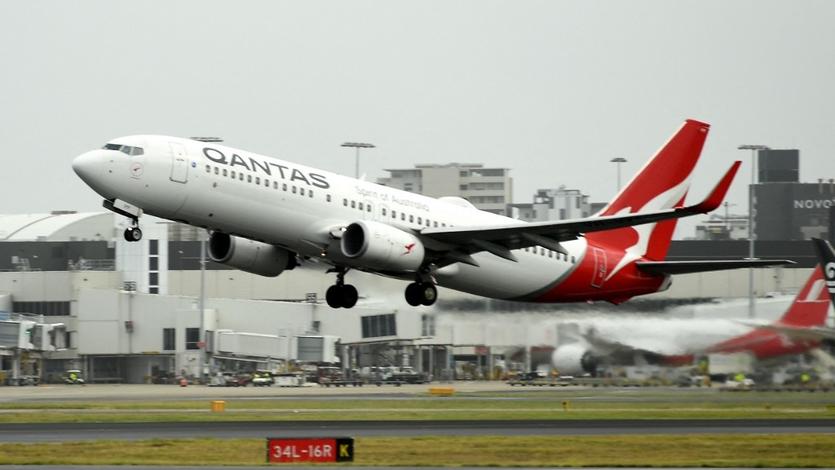 A Qantas plane takes off from the Sydney International airport on May 6, 2021. (SAEED KHAN / AFP)
A Qantas plane takes off from the Sydney International airport on May 6, 2021. (SAEED KHAN / AFP)
The name Qantas was once synonymous with all that was good about aviation – a perfect safety record, a loyal workforce and service that was second to none.
Today, the airline is in tatters. Flight cancellations, lost luggage, long check-in queues and all-round poor service is are what the airline now offers.
Jetstar, the airline’s subsidiary budget carrier, has been forced to cancel services, stranding passengers overseas because it does not have the engineers to service all its aircraft.
The Greens and independent members of parliament are calling for the renationalization of the airline, which was privatized during the 1990s in the belief it could be better run.
As ground staff prepare to go on strike on Sept 12 over pay and work conditions, Qantas CEO Alan Joyce is again threatening to ground the airline’s entire fleet
As ground staff prepare to go on strike on Sept 12 over pay and work conditions, Qantas CEO Alan Joyce is again threatening to ground the airline’s entire fleet. The aviation industry was stunned when Joyce grounded the airline on Oct 29, 2011, leaving tens of thousands of travelers stuck throughout Australia and overseas.
Tony Webber, CEO and founder of Airline Intelligence & Research, told the ABC on Aug 25, “How will Qantas react to industrial action? The same way they’ve always reacted, which is very, very aggressively.”
An aviation sector analyst and former chief economist at Qantas, Webber said the possibility of a total shutdown of the airline was “not out of the question for Alan Joyce”.
‘‘He shut down the airline in 2011 because of the persistence in strike activities, so if he believes that the conditions or the wage demands are unacceptable, then that could be where the airline ends up, being shut down for a period of time,’’ he told the ABC.
Ground handlers from air services provider Dnata, which contracts workers to 20 airlines in Australia, including Qantas, will walk off the job at airports around the country for 24 hours on Sept 12.
READ MORE: Qantas to buy rest of Alliance Aviation to expand footprint
In May, Qantas lost an appeal against a Federal Court decision that found the outsourcing of 1,700 ground crew workers was illegal.
Last year, in one of the largest reinstatement cases ever heard, the Federal Court found in favor of the Transport Workers Union, or TWU, against Qantas in the outsourcing of the 1,700 jobs by the airline.
In August 2020, Qantas outsourced its ground handling operations at 10 Australian airports to third party contractors, with 1,700 employees losing their jobs.
The TWU said the strike on Sept 12 would be over more than 20 guaranteed hours per week for part-time employees and pay increases.
‘‘For many, it’s now a choice between going on strike for decent conditions or being forced to leave the industry,’’ TWU national secretary Michael Kaine said.
The strike on Sept 12 will be the latest in a series of disputes between workers and airlines, particularly Qantas, which has been struggling to rebuild trust among workers and passengers after mass layoffs early in the pandemic left the airline struggling to meet demand when travel resumed.
A report on Sept 7 by the Australian Competition and Consumer Commission said on-time flights were at the lowest level ever recorded, with only 55 percent of flights arriving on time in July compared to the long-term average of 81.9 percent. And 6.1 percent of flights were cancelled – more than three times the long-term average of 2.1 percent.
ACCC chairperson Gina Cass-Gottlieb said the problem with Qantas is that it did not “properly make a realistic assessment of how many flights they could serve” as air travel rebounded after the pandemic
“It’s not good enough,” said ACCC chairperson Gina Cass-Gottlieb.
She said the problem with Qantas is that it did not “properly make a realistic assessment of how many flights they could serve” as air travel rebounded after the pandemic.
Two weeks ago Joyce apologized to Qantas customers for widespread delays, cancellations of flights and lost baggage, which he said were caused by staff shortages.
The airline laid off around 8000 employees – or close to a third of its workforce – when the pandemic grounded its operations. The layoffs included 1,700 baggage handlers and ground staff.
ALSO READ: Exxon delivers first sustainable aviation fuel cargo to Singapore
The public’s discontent with the national carrier, which has a market value of around A$9.6 billion (US$6.5 billion) has been taken up by the Greens.
The party's transport spokeswoman, Elizabeth Watson-Brown, said Qantas should be put back in public hands. The airlines was privatized in 1992, when Paul Keating was the prime minister.
“Privatization was meant to deliver more innovative, more efficient service,” Watson-Brown said.
“During the pandemic, despite receiving JobKeeper (a government payment support measure for companies to keep employees on the books) and other public funds to the tune of A$2 billion, Qantas laid off about 8,500 staff,” Watson-Brown said.
“Despite inflation spiking, engineers have not had a pay rise in four years,” she said.
In 2018, Joyce took home A$23.9 million as the airline enjoyed record profits – but this was reduced to A$1.7 million in 2020, due to the pandemic.
“It seems to me like privatization has been very good for the (executives) and very bad for the workers,” Watson-Brown added.
Contact the writer at


